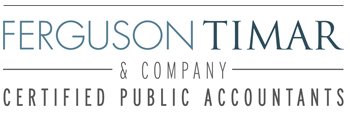
It has often been observed that a penny saved is a penny earned. If you are a small business owner, you understand it is often difficult to “save pennies,” even when business is booming. From labor to materials, fees to advertising costs—so many expenses and financial obligations drain your accounts that it can be difficult to feel as if you’re minimizing your company’s financial liabilities in meaningful ways with any regularity. Thankfully, though, if you take informed approaches, you can significantly minimize your company’s tax bills every year.
In this article, the knowledgeable CPAs at Ferguson Timar discuss ways small business owners can benefit from write-off opportunities. By taking advantage of all deductions available to you and your company, you can save more than pennies in 2024 and beyond.
Start-Up Deductions
If you are a new business owner, you may be able to deduct many of the costs associated with launching your company. These costs may be classified as capital expenses, as starting a business is technically an investment opportunity. Be strategic in how you time your start-up deductions, as the amortization process is an opportunity that tends to unfold over the span of a few years.
Rent or Home Office Deductions
If you do not own the space where you work, you may be able to deduct the cost of its use. If you work out of a dedicated space in your home, you may be able to claim a home office deduction on your personal tax return. If you operate your business out of a space subject to the terms of a commercial lease, you may be in a position to deduct rent and property management costs.
Inventory and Depreciation Deductions
If your company manufactures and/or sells goods, you may be able to deduct a portion of your inventory at the end of the year if you properly value it at the beginning and end of the same year. Additionally, you may be able to write off the depreciation of the equipment and machinery used to craft your company’s goods over the course of a few tax cycles.
Insurance and Utilities
Many of the everyday expenses associated with running a business are, in fact, tax deductible. This is true even for many necessary expenses that small business owners might overlook as opportunities to mitigate their tax liability. For example, several types of insurance coverage and utility bills can be written off as business expenses.
Business Expenses
This vague term can be used to cover a host of different costs, provided the expenses in question can reasonably be interpreted as both “helpful and appropriate” and “common and accepted in your trade” per the IRS. Essentially, if a good or service is considered ordinary and necessary for your type of work, it likely can be deducted as a business expense. From printer paper to domain registration, cleaning services to the cost of gas for a company vehicle, many common costs of doing business are write-off opportunities.
Charitable Contributions
Just as individuals can deduct certain kinds of charitable giving, so can businesses. For example, your company may have donated the cost of jerseys to a local school’s basketball team or provided free coffee for a church function. Speak with our team about how to verify and report all of your qualifying good deeds so that your company’s tax liability can benefit from your generosity.
Travel Expenses
If your business owns vehicles or you use your personal vehicle for business purposes, you should be able to deduct certain travel-related costs from your tax liability. Actual expenses—such as the purchase of a vehicle or gas—and mileage traveled for company business can be deductible under certain circumstances. For the 2023 tax year, standard business mileage is reimbursable at a rate of 65.5 cents per mile. For the 2024 tax year, this rate increases to 67 cents per mile.
Salaries and Fringe Benefits
As ordinary business expenses for goods and services are deductible, so are the salaries and fringe benefits afforded to small business employees and contract workers. Fringe benefits include the employer-related costs of offering life insurance policies, memberships to fitness clubs, and many other employment-related costs associated with retaining talent.
Allow Ferguson Timar CPAs to Help You Plan for the Upcoming Tax Year
Chances are some of these deduction opportunities are news to you. That wouldn’t be surprising, as the U.S. tax code is both complex and ever-changing. Additionally, some tax incentives are obvious, while others aren’t. These are two of many reasons why small business owners generally benefit from speaking with CPAs about their tax strategies. By connecting with a CPA, small business owners can become more empowered to make informed decisions about minimizing their tax liability whenever and wherever possible.
Whether you’re a new or seasoned small business owner, the CPAs at Ferguson Timar are ready to help you lower your company’s tax bills in 2024 and beyond. Contact our dedicated team today at (714) 204-0100 for personalized tax guidance tailored uniquely to your company’s circumstances and your entrepreneurial vision of the future. We look forward to speaking with you.
